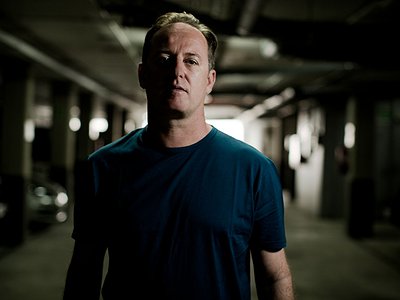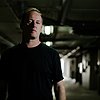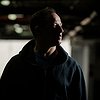Name: Alexander Paul Coe / Sasha
Nationality: British
Occupation: DJ, Producer
Current Event: Sasha will release his new Mix-CD fabric 99 on June 22nd. He will also return to London, Manchester and Glasgow with his new live show REFRACTED. Tickets for the London & Manchester Sasha shows can be bought here. Glasgow tickets are available here.
This interview with Sasha is part of a series of in person conversations based more loosely on the 15 Questions concept, allowing for more personal and open questions.
Website / Contact: If you enjoyed this interview with Sasha, visit his facebook page for current gig news, insights, videos and photos. Sasha also has a personal website with a shop and tour dates.
When did you start DJing - and what or who were your early passions and influences? What what is about music and/or sound that drew you to it?
I started DJing in 1988 in Manchester. In 1987 I was living in Whales, and I was driving up every few weekends to Manchester to go clubbing, when I was like 17-18. In 1987 the dance music scene in Manchester was early House music mixed with Electro, and The Haçienda was very mixed - it was actually a Black crowd there and it was very focused on all these group of dancers on the dance floor, and they were all doing these moves and having these dance-offs. It was kind of funny. I remember everyone was wearing dark clothes, dark jeans, Doc Martens shoes and I liked the music. Then, I hadn't been in a few months and I came back in early 1988, and acid house had arrived. I got into the club and it was absolute carnage - its was laser lights, strobe lights, smoke machines. The place was packed, just full of young white kids, all kind of off it and dancing this crazy dance and the music was going mental ... rave had arrived.
What had you been listening to before these experiences?
When I was a kid we'd always listen to lots of things. We'd always do these long car journeys. My dad had a really good stereo in his car and we used to all listen to music. There was some really great pop music written in the 80s, with lots of synthesizers. I was obsessed with Nick Rhodes from Duran Duran, he was always in those videos with all these synthesizers around him. I was always wondering "what's he doing?" - I wasn't interested in the guys with the guitars at the front, I was more interested in the nerd at the back. Even records like Kraftwerk - Tour De France was a top 10 record in England.
I had an uncle who used to collect records, and I remember he used to have some really weird records. There were a couple I really liked when I was very young; one was a synthesized version of the Star Wars music, and then there was a Japanese artist - whose name has split my mind - who made all this kind of spacey music. My uncle thought it was kind of funny and would laugh at it, but I thought it was amazing. I used to love that stuff when I was a kid - I was definitely interested in the sounds that synthesizers made.
What made the Haçienda special?
Walking into the Haçienda and seeing the reaction between the crowd and the music, and this completely alien sound to me ... you know my chin was on the floor. I dropped out of school very shortly after that so that I could move to Manchester and I could go to the club every night it was open basically. It was my church.
We used to go on Wednesday nights. Friday night was the crazy night, Saturday night was what we used to call the "hairdresser's night" but it was more like a night where lots of people used to get dressed up. Friday night was the crazy ravers night. Then Wednesday night was the night I liked the most, cause it wasn't as busy and the DJ there was a guy called Jon Dasilva. he used to play with Mike Pickering who did the Friday and the Wednesday. Mike Pickering and Graeme Park played on the Friday together, it was called Nude night, it was the biggest thing in Manchester. It was very hard to get in, I would always get there at like 8:30 PM and be one of the first in the queue so I could be one of the first on the dance floor. The Wednesday night wasn’t quite as packed sometimes, but once I started understanding what was going on in the DJ booth as they were mixing things together, I started to listen, I started to realise what Jon Dasilva was doing.
It was really interesting cause he would always mix things in in key, and he was using acapelas, and sound effects. I started to notice he'd be using two copies of the same record, and stopping and starting, and doing really great things. I know he was influenced a lot by the New York DJs like Shep Pettibone and the radio mixes that came out of NY, so he had all these tricks up his sleeve. He would stop the music, and the lights would go off, they'd play these thunderclaps and then start one of the biggest records of the night again and the place would go mental.
I started to love getting into the club really early, you know at 9PM the doors would open and I wanted to be the first on the dance floor, cause I used to love knowing how the DJs would start testing records out between 9-11PM - The Haçienda used to finish at 2AM on the dot, which is different with clubs now going 24-hours. And then maybe a couple of weeks later they would be playing them between 11PM and 12AM. Then a month later it would be in the last hour, and it would be an anthem. I started to realise how DJs were working up, and testing things out, breaking and building records. So I always used to love getting there early and hearing that early part of the set, cause it was always music I didn't know. It was always my favourite part of the night, to hear that build up. Whereas after midnight they started playing records that everyone recognised and get the crowd going crazy.
So you learned by being a dancer moved by these incredible DJs.
Yes, I think everything that I learned then is kind of imprinted in my brain. What a DJ set was supposed to be like, and what the purpose was of it, and how to break records, how to lift people up with music, how to get that connection between the DJ and the dance floor. Which kind of starts in this abstract, empty hall, with new music blurring out and the room filling up; just that collective energy that builds up in the room as the DJ starts to weave that magic and connect with the crowd, I used to wonder at that.
So I started buying records, trying to get gigs myself and starting off with local bookings for £20. You know everyone has a story about a lucky break in their career. In 1989 I moved into this block of flats, and the first day there's a knock at the door and it's my next door neighbour; it was Jon Dasilva! It was just complete fluke and stroke of luck, he took me under his wing, and I just started watching everything that he did, listening to music with him and gradually he started throwing me a bone, letting me do a warm up gig here and there. It really was one of those amazing coincidental lucky breaks, it was what got me my first gigs. I was 18 years old, I'd moved into an apartment block and my hero was living next door. So yeah it was pretty amazing.
How did you get started?
I bought myself about 50 records - I had between 50 and 100 records. I'd heard this guy at a pirate station was looking for DJs in Manchester WBLS and I was like 'yeah I can DJ' so I got in touch with the guy. My slot was 4-6AM Friday and Saturday night, and this station played all this kind of Rare Groove, RnB stuff, a lot of old stuff, bootlegs, Soul ... anyway I would go up at 4AM and I would just play crazy Acid House. I remember after the first show the guy came in at 6AM, he'd obviously woken up and heard what was coming out of the radio like 'what the hell is this'. But he started getting loads of feedback about people really liking what I was playing, although he was a little against it. He'd ask me "can you mix it up with some of the Rare Groove stuff?" So I started buying a lot of those records as well.
For most artists, originality is first preceded by a phase of learning and, often, emulating others. What was this like for you?
But even though I'd already done a few gigs where I'd play before Jon Dasilva and I was definitely just trying to copy what he was doing. I didn't have my own style whatsoever. I remember the first time he offered me a gig he calls me up and says "Mike Pickering from the Haçienda is sick, can you play with me tonight?" and it was my first show there. I must have called everyone I knew in Manchester like "I'm playing the Haçienda!" and I remember that set. Jon must have been absolutely mortified, but when I went into the Haçienda I literally must have played his last hour set, record for record, using acapellas, the place was going absolutely ballistic and it was at 10:30/11 PM. Poor Jon he had to play after me and he must have been like "right, you just played all my big records you twat" (laughing). So he was probably the one I tried to emulate the most. But then I guess my own sound started to develop out of that. It just comes from playing out, and getting reactions from records. It’s really important.
I get so many DJ mix tapes, I listen to so many mixes and they just don't have any kind of uniqueness to them. But then there's a reason why a lot of the big names are successful and have done very well: It's cause you can spot their set because they've got that unique sound and it's something that just develops over time, I think. It’s something that can move and change around quite a lot also. I think that all the successful DJs have an ear and think "okay this is what I want to be playing", and there’s not enough of that music around so I need to make more music like that. And then once you start making music like that, people send you stuff that’s like that, and it can develop that way.
I think your first steps into are always just emulating your heroes, there's no shame. You know when I was 18/early 20s I just lived and breathed DJing, I would go and DJ at the club, I would go and DJ at the afterpary. I would wake up in the morning and I would have my decks in my front room. That's just what I did, I put my 10,000 hours in very quickly I think with DJing, it was all I cared about at that time. And then I got into producing, and then the touring kicked in and started travelling around the world, and then it's hard to be in the studio and to get access to decks. Then it becomes a balancing act of how much time you get to practice and put into it.
What were some of the main challenges and goals when starting out as a DJ and how have they changed over time?
There's wasn't really a blueprint, and there weren't really role models. There wasn't really any press back then about DJs, I think I was the first DJ they put on the cover of Mixmag - up to that point it had always been about a pop artist that had some dance mixes done; whether it would be Seal or Madonna. They didn't start putting DJs on the covers of magazines and interviewing them until getting into the 90s. Global Underground came along and started doing official mixed tape releases as CDs, doing advertising campaigns. There was none of that in the early days, so there wasn't anyone I aspired to be other than my heroes that were in the DJ booth and me just wanting to do that and being absolutely in love with the music. It wasn't like I was sitting there and planning a music career; I was very surprised about the career that developed off the back of that. There was a point in the early 90s where I didn't DJ for about six months I think, and I was like "okay I'm gonna have to get a real job" and then right off the back of that something wonderful came in and my career really took off.
Whereas getting into it now I realise that you can get this lifestyle and this incredible financial career out of it.
What is it about DJing, compared to, say, producing your own music, that makes it interesting for you?
The part of DJing that I really enjoy is doing those really long sets and playing when the room is filling up. I don't get to do it that often. It's something I always really enjoy because you really are connecting with people and reading the room, feeding off the energy; and you feel it, you really feel it when you're playing from an empty room and then the room fills up, it's a really lovely thing to do. The DJing and the producing - it's kind of a pendulum, when I've been in the studio for ages making music I just can't wait to get out and play, and then when I've been on the road loads I think "I could really use getting back into the studio again". I think it's been one of the biggest struggles throughout my career. To keep the balance of studio and DJ work proportionately. It's much easier now, that we have laptops that are so powerful. I know a lot of people that mix stuff on the road in their headphones and then play it out that night. I'm not that good an engineer, so I have an engineering team and a producing team back in London that I send my ideas to, and they get them sounding like I need them to sound.
That's the only reason I've been able to put so much music out over the last couple of years, I think I finally found a bit of a balance between being on the road and having that base in London where my production team is. They get stuff sounding great to me, send stuff back to me quickly, you know everything is linked up with Dropbox now. It's very easy to get ideas back and forwards.
Do you work on new material on the road?
I slept all day today in Bali and I'm probably going to be up all night, so I'll probably be fiddling around with my music, I'll have a track I'm playing around with and if it's starting to sound good I'll get it to them, and I might have it back in time for this weekend so I can test it out. So rather than seeing it as a disadvantage, which I did for years, I couldn’t seem to find that balance between my DJing - which has become all-consuming - and then I wouldn’t put a record out for six months a year, because I was just too busy on the road. Then I'd go in the studio and lock myself up for three or four months and then my DJing had become neglected. Just trying to get that balance has taken a long time. It took 3 or 4 years to get this kind of process right, but the technology moved forward and we realised we could sync everything with Dropbox and started to work like this. So I actually see it now as an advantage, when I'm jetlagged and I can't sleep and it's 2am in Tokyo; rather than sitting there and getting annoyed with myself that I can't sleep, I actually work on some music and I’ve found that I’ve written some really interesting melodies. I've found some really great things at those weird hours, it's a really fantastic time to write music; no-one is calling you, no-one is bothering you, you’re in a foreign country and you can really just zone out. Half the problem if you live in a big city like London or New York or L.A., is getting to work and to focus. Dealing with normal everyday shit, the mundane stuff can really get in the way of making music sometimes. You have to be very disciplined and focus to just walk into the studio and go "alright now I’m just working on music for the next 8 hours and no-one is going to disturb me". Whereas when I’m on the road and I’m jetlagged in some weird hotel room or country somewhere, I’ve got all that time to focus on writing, and I’ve got some really great results that way.




